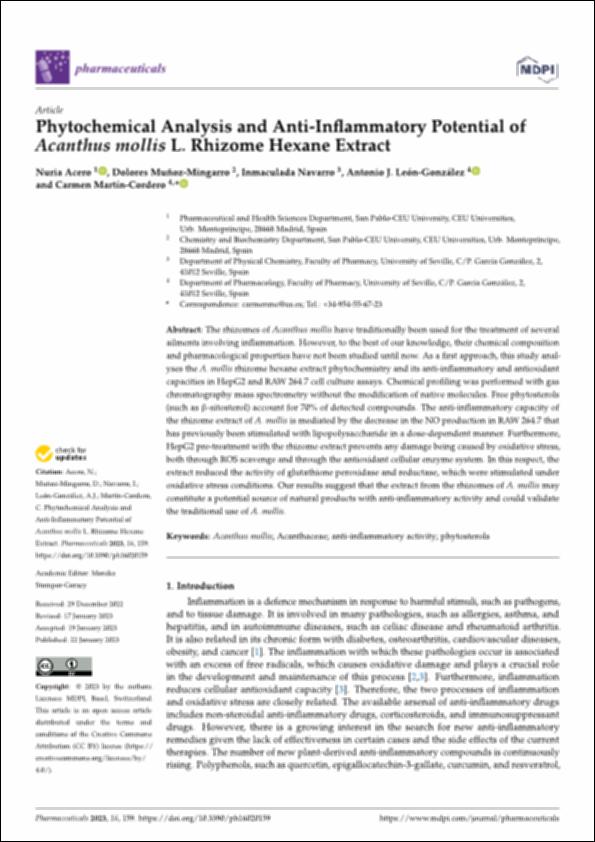Please use this identifier to cite or link to this item:
http://hdl.handle.net/10637/15709Phytochemical Analysis and Anti-Inflammatory Potential of Acanthus mollis L. Rhizome Hexane Extract
| Title: | Phytochemical Analysis and Anti-Inflammatory Potential of Acanthus mollis L. Rhizome Hexane Extract |
| Authors : | Acero de Mesa, Nuria Muñoz Mingarro, Dolores Navarro, Inmaculada León-González, Antonio J. Martín-Cordero, Carmen |
| Keywords: | Acanthus mollis; Acanthaceae; Anti-inflammatory activity; Phytosterols |
| Publisher: | MDPI |
| Citation: | Acero, N.; Muñoz-Mingarro, D.; Navarro, I.; León-González, A.J.; Martín-Cordero, C. Phytochemical Analysis and Anti-Inflammatory Potential of Acanthus mollis L. Rhizome Hexane Extract. Pharmaceuticals 2023, 16, 159. https://doi.org/10.3390/ph16020159 |
| Abstract: | The rhizomes of Acanthus mollis have traditionally been used for the treatment of several ailments involving inflammation. However, to the best of our knowledge, their chemical composition and pharmacological properties have not been studied until now. As a first approach, this study analyses the A. mollis rhizome hexane extract phytochemistry and its anti-inflammatory and antioxidant capacities in HepG2 and RAW 264.7 cell culture assays. Chemical profiling was performed with gas chromatography mass spectrometry without the modification of native molecules. Free phytosterols (such as -sitosterol) account for 70% of detected compounds. The anti-inflammatory capacity of the rhizome extract of A. mollis is mediated by the decrease in the NO production in RAW 264.7 that has previously been stimulated with lipopolysaccharide in a dose-dependent manner. Furthermore, HepG2 pre-treatment with the rhizome extract prevents any damage being caused by oxidative stress, both through ROS scavenge and through the antioxidant cellular enzyme system. In this respect, the extract reduced the activity of glutathione peroxidase and reductase, which were stimulated under oxidative stress conditions. Our results suggest that the extract from the rhizomes of A. mollis may constitute a potential source of natural products with anti-inflammatory activity and could validate the traditional use of A. mollis. |
| URI: | http://hdl.handle.net/10637/15709 |
| Rights : | http://creativecommons.org/licenses/by-nc-nd/4.0/deed.es OpenAccess |
| ISSN: | 1424-8247 |
| Issue Date: | 22-Jan-2023 |
| Center : | Universidad San Pablo-CEU |
| Appears in Collections: | Facultad de Farmacia |
Items in DSpace are protected by copyright, with all rights reserved, unless otherwise indicated.


